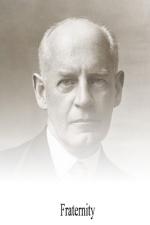She sat down on the bed, and, turning the leaves rapidly till she reached a certain page, rested the paper in her lap. Her eyes were fixed on a photograph in the left-hand corner-one of those effigies of writers that appear occasionally in the public press. Under it were printed the words: “Mr. Hilary Dallison.” And suddenly she heaved a sigh.
The room grew darker; the wind, getting up as the sun went down, blew a few dropped petals of the pear-tree against the window-pane.
CHAPTER XII
SHIPS IN SAIL
In due accord with the old butler’s comment on his looks, Hilary had felt so young that, instead of going home, he mounted an omnibus, and went down to his club—the “Pen and Ink,” so called because the man who founded it could not think at the moment of any other words. This literary person had left the club soon after its initiation, having conceived for it a sudden dislike. It had indeed a certain reputation for bad cooking, and all its members complained bitterly at times that you never could go in without meeting someone you knew. It stood in Dover Street. Unlike other clubs, it was mainly used to talk in, and had special arrangements for the safety of umbrellas and such books as had not yet vanished from the library; not, of course, owing to any peculative tendency among its members, but because, after interchanging their ideas, those members would depart, in a long row, each grasping some material object in his hand. Its. maroon-coloured curtains, too, were never drawn, because, in the heat of their discussions, the members were always drawing them. On the whole, those members did not like each other much; wondering a little, one by one, why the others wrote; and when the printed reasons were detailed to them, reading them with irritation. If really compelled to hazard an opinion about each other’s merits, they used to say that, no doubt “So-and-so” was “very good,” but they had never read him! For it had early been established as the principle underlying membership not to read the writings of another man, unless you could be certain he was dead, lest you might have to tell him to his face that you disliked his work. For they were very jealous of the purity of their literary consciences. Exception was made, however, in the case of those who lived by written criticism, the opinions of such persons being read by all, with a varying smile, and a certain cerebral excitement. Now and then, however, some member, violating every sense of decency, would take a violent liking for another member’s books. This he would express in words, to the discomfort of his fellows, who, with a sudden chilly feeling in the stomach, would wonder why it was not their books that he was praising.




